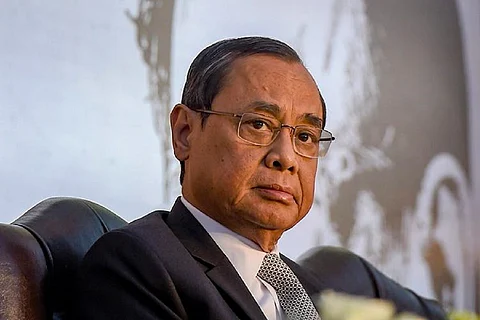

Former Chief Justice of India (CJI) Ranjan Gogoi, credited for bringing the curtains down on the sensitive Ayodhya land dispute, on Wednesday, December 8, said he should not have been part of the bench to hear a case related to sexual harassment allegations against him. He said, “We all make mistakes and there was no harm in accepting it.”
Speaking at the launch of his autobiography, ‘Justice for the Judge,' Justice Gogoi, the first head of judiciary from northeast states, spoke about all the issues, including controversial ones, during his tenure as the 46th CJI and vehemently denied the allegation of quid pro quo in getting the Rajya Sabha nomination in lieu of the Ayodhya verdict.
“In hindsight, I should not have been a judge on the bench (which heard alleged sexual harassment case against him). 45 years of my hard work in bar and bench was being spoiled. It might have been better, if I was not part of the bench. We all make mistakes. No harm in accepting it,” he told a private news channel at the book launch function.
In 2019, a former Supreme Court staffer had accused him of sexually harassing her, and pursuant to her allegations, the Supreme Court took a suo motu cognisance and a three-judge bench headed by Justice Gogoi was constituted.
He was later given a clean chit by an in-house committee of three judges headed by Justice SA Bobde. Other members of the committee were two women judges — Justices Indu Malhotra and Indira Banerjee. The former CJI, simultaneously, defended the procedure of the in-house panel to probe into the allegations saying that it has been there for the last 20 years.
"Any Tom Dick and Harry making a complaint does not get it investigated. The in-house proceeding is not toothless. If found guilty they step down and the President approves impeachment," he said.
On the issue of interference of the executive in the functioning of the judiciary, he said there was “NIL interference.”
“Who dares to come to Gogoi, do this and that? Who would come? I would display my warrior skill and call All India Radio and tell them. There was no interference,” he said. Justice Gogoi said that he did not meet the Prime Minister even once during his tenure as the CJI and those who took selfies with the PM have now become activist judges.
He said people claimed that ‘daal mein kuch kaala hai' (there is something fishy) when the Prime Minister visited the apex court before the Rafale judgement.
'Daal to kaala hi hota hai. Nahi toh kya daal hai' (Daal is always black, otherwise what daal is it) He (PM) came on November 26 on Constitution Day. I do not think anything wrong with it. There were judges who took selfies with the PM and now they are activist judges (sic),” he said.
The allegations of ‘quid pro quo' are all made up by the media and newspapers, he said, adding, “I was least convinced that democracy was in peril. Similarly, I am least convinced about the Rajya Sabha seat offered to me as quid pro quo for the Ayodhya judgment.”
“If I had become chairman of NHRC (National Human Rights Commission)? Would you have said the same thing? I am sick and tired of repeating that I won't,” he said. He said that he has been made the MP by a nomination by the President and has not joined any political party and hence is free to express views for or against the government.
About the dramatic and unprecedented January 12, 2018 press conference against the functioning of the then CJI Dipak Misra, Justice Gogoi said that he was under the impression that he would be meeting journalists covering the apex court at the residence of Justice (since retired) J Chelameswar.
“It is very easy to say that I don't know what I walked into. We addressed the press and that was my idea. I believed it was the right thing to do at that time. We had to call the conference because we were unable to persuade the then CJI Dipak Misra regarding the allocation of cases to benches. I hope it is the last occasion,” he said.
Speaking about the Ayodhya case and the allegations of sidetracking cases of human rights, he said, “I did not resurrect Ayodhya. It is a responsibility which my predecessor gave to me and allotted a date. I had two options, to run or to fight. Justice Bobde said I come from a family of warriors so I fought.”
He said the cases on Kashmir were allocated to an alternate bench and the matter was not allowed to hibernate.
On the critical issue of reinstatement of a woman, who had levelled the allegations against him, Justice Gogoi said she was reinstated during his tenure only as his successor received a letter for re-appointment on humanitarian grounds.
“He (Justice Bobde) asked me and I said deal with it. Justice Bobde reinstated her with compassion,” Justice Gogoi said.
Justice Gogoi, hailing from Dibrugarh in Assam, became the CJI on October 3, 2018, and demitted office on November 17 next year.